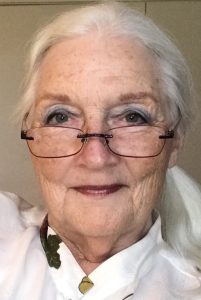Editor’s Note: This is the fifth in a series of articles on sexual diversity. The following story represents many individuals and families who seek answers to gender and sexuality questions. Details have been changed to protect privacy.
The man waiting in the counselor’s outer office showed up at the insistence of his sister and best friend, but he had a plan. He would reveal his shameful secret to the counselor. What a relief that would be! The counselor would refer him to conversion therapy. His sister would be relieved. Then he would go home and kill himself. Finally!

Linda Cross

Dan McGee
The grief, the regret, the fear, the self-loathing, the hiding finally would be over. He was a pharmacist, and he had worked out his plan. “Shaming doesn’t kill you,” he thought bitterly. “It just leaves you for dead.”
Loving parents raised him in a Christian home. He developed into a respected professional, active in church and community. So, what terrible thing had he done that so wrecked his life? He was born “wrong” — born a female trapped in a male body.
The imposed guilt and shame, as well as frustration and isolation, were overpowering. She had been acting a part for as long as she could remember, second-guessing every behavior and avoiding any close connections for fear of exposing herself to ridicule and rejection. She was tired — dreadfully, utterly exhausted. She longed for the solace of death.
She knew the counselor was a Christian, and she knew what her own church believed about gender diversity. She secretly checked out a conversion therapy program and even tried some of the things its leaders suggested. But sexual conversion was not for her. She waited for the words of condemnation and dismissal she knew were coming.
How would this story end in your church? What would happen if this counselor was a staff member? What are the possible endings to this story?
One possibility, probably the most common, is the counselor listens sympathetically but reminds her God doesn’t make mistakes and she is, in fact, a male. She must repent of her sin, cleanse her mind of such erroneous thoughts and begin the conversion therapy program offered by the church for people who are so mistaken about who God created them to be.
No witness reports Jesus shaming any of the outcasts of his generation.
But for just a moment, let’s consider another possible ending. Although the culture wars have reduced Jesus’ example to a slogan for T-shirts and bracelets, let’s consider what the New Testament writers tell us Jesus did — and didn’t do. No witness reports Jesus shaming any of the outcasts of his generation. Jesus didn’t shame bleeding women, shun dying Gentile girls, deny convicted criminals or berate government tax collectors. He touched lepers, raised the dead and welcomed women into his circle of closest friends.
But Jesus did not presume. He practiced humility. When someone asked for his help, he often asked what they wanted him to do — even though it probably seemed obvious to bystanders what they needed. He respected the people who called on him enough to listen to them, to hear them and to respond to their perception of their needs.
How can we practice such humility? We can learn from Jesus’ example to walk humbly among and with our neighbors, learning from them about their lives, their histories and their hopes and dreams. We can even listen to the little children who know there is some disconnect between their bodies and who they know themselves to be. We can admit we do not know it all.
Furthermore, the Bible — Old Testament and New — is full of people whose names are changed to match new identities. So why are we so resistant to allowing folk to give themselves a new name, reflective of a new self-understanding?
And then, there are the pronouns. Why do so many of us take such offense at respecting another person’s choice of pronouns? What do you think Jesus would do under these circumstances? Does Jesus draw the line at the end of the first century and demand no cultural, psychological, doctrinal or personal growth in understanding beyond that point?
If we are unable to walk humbly, can we at least make enough room for the mercy that honesty, justice and humanity demand? If not us now, then who when?
If we are unable to walk humbly, can we at least make enough room for the mercy that honesty, justice and humanity demand? If not us now, then who when?
Can we really imagine a different ending to the story we started with? Yes. We can imagine it and embrace it.
We can admit our own discomfort and ask forgiveness for our indifference to others’ misery. We can delete inappropriate, insensitive and hateful words from our mental vocabularies. We can ask questions, humbly, when we don’t understand what another is experiencing. We can stand with someone who is left standing alone due to difference and indifference.
Fortunately for some among us, the condemnation doesn’t come. Instead, counselors gently question and tenderly hold painful answers.
To the counselor’s surprise, the client we mentioned at the start of this column talked about her deep faith in Christ — a faith that had sustained her throughout her years of despair. After hearing her story, the counselor concluded she didn’t need conversion therapy. Although antidepressants and psychotherapy were prescribed, this young woman needed a support system to walk with her through the transitions that were sure to come.
With that thought in mind, the counselor told her about a nearby welcoming and affirming church whose pastor described how the congregation had been blessed by welcoming marginalized people into their membership. Before their next session, the counselor called that pastor for other resources to help this young woman find a new way to live openly and unashamedly.
Ethel Waters, born to a 12-year-old mother impregnated by rape, was tossed around as a child and married off by her mother at age 13. Black, divorced while still a teenager and bisexual, she somehow survived and through tenacity and amazing talent became a groundbreaking jazz, blues and gospel artist before becoming an Oscar-nominated and Emmy-winning star of movies, television and Broadway. Later in life, returning to the faith of her youth, she regularly sang at Billy Graham crusades around the world. “I knew I was somebody,” she said, “’cause God don’t make no junk.”
“God don’t make no junk.” There are few happily-ever-afters in these difficult stories, but there can be healthy-afters.
Linda Francis Cross is a professional writer and communications consultant covering spiritual issues and biblical curriculum. She was an advocate for leadership development for CBF Global Missions and prior to that director of the Baptist Laity Institute of the Baptist General Convention of Texas. She has served as editor on several books and as a co-author for Radical Excellence. She is an ordained Baptist minister and earned her bachelor’s and master’s degrees from Baylor University. Dan McGee is an author, blogger and consultant on spiritual issues with an extensive background in psychology and ministry. He is an ordained Baptist minister with a bachelor’s degree from Baylor University, master’s degree from Southwestern Baptist Theological Seminary and Ph.D. from Texas Woman’s University. As a clinical sexologist and director of the Hardin-Simmons University Graduate Program in Family Psychology, Dan directed the Family Psychology Center and was responsible for clinical supervision of all interns in practice there and at satellite centers across West Texas. He is the author of Celebrating Sex in Your Marriage and Experiencing God’s Presence.
Related articles:
When a teenager gets kicked to the curb by Christian parents


